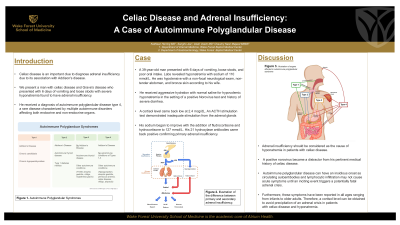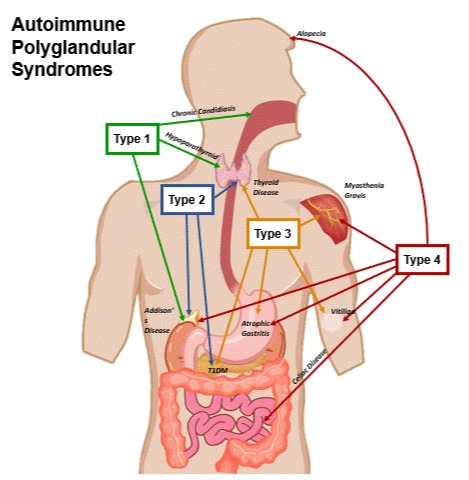Back


Poster Session B - Monday Morning
Category: Small Intestine
B0674 - Celiac Disease and Adrenal Insufficiency: A Case of Autoimmune Polyglandular Disease
Monday, October 24, 2022
10:00 AM – 12:00 PM ET
Location: Crown Ballroom

Has Audio
.jpg)
Kathleen Herring, MD
Internal Medicine Residency Program, Wake Forest University School of Medicine
Winston-Salem, NC
Presenting Author(s)
Kathleen Herring, MD1, Sangho Jee, BA2, Izzah Vasim, MD2, Chaudry Majeed, MBBS2
1Internal Medicine Residency Program, Wake Forest University School of Medicine, Winston-Salem, NC; 2Wake Forest Baptist Health, Winston-Salem, NC
Introduction: Our cases illustrates that celiac disease is an important clue to diagnose adrenal insufficiency due to its association with Addison's disease. We present a case of a man with celiac disease and Grave's disease who presented with 6 days of vomiting and loose stools with severe hyponatremia found to have adrenal insufficiency. He received a new diagnosis of autoimmune polyglandular disease type 4, a rare disease characterized by multiple autoimmune disorders affecting both endocrine and non-endocrine organs.
Case Description/Methods: A 39 year old man with Graves status post iodine ablation on levothyroxine and celiac disease presented with 6 days of vomiting, loose stools, and poor oral intake. His family members complained of similar symptoms. He presented at an urgent care center whose labs revealed hyponatremia with sodium of 110 mmol/L. In the ED he was hypotensive with physical exam revealing a non-focal neurological exam, non-tender abdomen, and bronze skin according to his wife. Labs came back with worsening hyponatremia at 106 mmol/L. He was admitted to the ICU where he received aggressive hydration with normal saline for the initial diagnosis of hypovolemic hyponatremia in the setting of a positive Norovirus test and history of severe diarrhea. His sodium level did not improve so a cortisol level was ordered which came back low at 2.4 mcg/dL. An ACTH stimulation test demonstrated inadequate stimulation from the adrenal glands which prompted the administration of hydrocortisone. His sodium began to improve with the addition of fludrocortisone and hydrocortisone to 127 mmol/L. His 21 hydroxylase antibodies came back positive confirming primary adrenal insufficiency. Due to his celiac disease, Grave's disease, and Addison's disease he received the diagnosis of autoimmune polyglandular type 4 disease.
Discussion: Our case demonstrates that adrenal insufficiency should be considered as the cause of hyponatremia in patients with celiac disease. A positive norovirus became a distractor from his pertinent medical history of celiac disease. Autoimmune polyglandular disease can have an insidious onset as circulating autoantibodies and lymphocytic infiltration may not cause acute symptoms until an inciting event triggers a potentially fatal adrenal crisis. Furthermore, these symptoms have been reported in all ages ranging from infants to older adults. Therefore, a cortisol level can be obtained to avoid precipitation of an adrenal crisis in patients with celiac disease and hyponatremia.

Disclosures:
Kathleen Herring, MD1, Sangho Jee, BA2, Izzah Vasim, MD2, Chaudry Majeed, MBBS2. B0674 - Celiac Disease and Adrenal Insufficiency: A Case of Autoimmune Polyglandular Disease, ACG 2022 Annual Scientific Meeting Abstracts. Charlotte, NC: American College of Gastroenterology.
1Internal Medicine Residency Program, Wake Forest University School of Medicine, Winston-Salem, NC; 2Wake Forest Baptist Health, Winston-Salem, NC
Introduction: Our cases illustrates that celiac disease is an important clue to diagnose adrenal insufficiency due to its association with Addison's disease. We present a case of a man with celiac disease and Grave's disease who presented with 6 days of vomiting and loose stools with severe hyponatremia found to have adrenal insufficiency. He received a new diagnosis of autoimmune polyglandular disease type 4, a rare disease characterized by multiple autoimmune disorders affecting both endocrine and non-endocrine organs.
Case Description/Methods: A 39 year old man with Graves status post iodine ablation on levothyroxine and celiac disease presented with 6 days of vomiting, loose stools, and poor oral intake. His family members complained of similar symptoms. He presented at an urgent care center whose labs revealed hyponatremia with sodium of 110 mmol/L. In the ED he was hypotensive with physical exam revealing a non-focal neurological exam, non-tender abdomen, and bronze skin according to his wife. Labs came back with worsening hyponatremia at 106 mmol/L. He was admitted to the ICU where he received aggressive hydration with normal saline for the initial diagnosis of hypovolemic hyponatremia in the setting of a positive Norovirus test and history of severe diarrhea. His sodium level did not improve so a cortisol level was ordered which came back low at 2.4 mcg/dL. An ACTH stimulation test demonstrated inadequate stimulation from the adrenal glands which prompted the administration of hydrocortisone. His sodium began to improve with the addition of fludrocortisone and hydrocortisone to 127 mmol/L. His 21 hydroxylase antibodies came back positive confirming primary adrenal insufficiency. Due to his celiac disease, Grave's disease, and Addison's disease he received the diagnosis of autoimmune polyglandular type 4 disease.
Discussion: Our case demonstrates that adrenal insufficiency should be considered as the cause of hyponatremia in patients with celiac disease. A positive norovirus became a distractor from his pertinent medical history of celiac disease. Autoimmune polyglandular disease can have an insidious onset as circulating autoantibodies and lymphocytic infiltration may not cause acute symptoms until an inciting event triggers a potentially fatal adrenal crisis. Furthermore, these symptoms have been reported in all ages ranging from infants to older adults. Therefore, a cortisol level can be obtained to avoid precipitation of an adrenal crisis in patients with celiac disease and hyponatremia.

Figure: Figure 1. Illustration of the types of autoimmune polyglandular disorders.
Disclosures:
Kathleen Herring indicated no relevant financial relationships.
Sangho Jee indicated no relevant financial relationships.
Izzah Vasim indicated no relevant financial relationships.
Chaudry Majeed indicated no relevant financial relationships.
Kathleen Herring, MD1, Sangho Jee, BA2, Izzah Vasim, MD2, Chaudry Majeed, MBBS2. B0674 - Celiac Disease and Adrenal Insufficiency: A Case of Autoimmune Polyglandular Disease, ACG 2022 Annual Scientific Meeting Abstracts. Charlotte, NC: American College of Gastroenterology.
